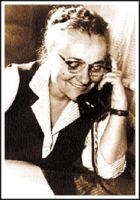Michalina Tatarkowna-Majkowska
Why do we consider this woman to be an important person?
Michalina Tatarkówna - Majkowska was the only woman in the People's Republic of Poland who achieved the highest positions in government. She was a communist who believed in socialism, but most of all a social activist to whom the workers' rights and living conditions were very important, but women and children were the most important to her. She was also a feminist and talented politician raising funds for the development of her hometown - Lodz. With no formal education, she led the party at the difficult time of deep communism prevailing in Poland before Josef Stalin’s death and shortly afterwards when some democratic initiatives were finally possible.
Because she was the activist of the working party she protested against the violation of labour rights of women in the textile industry of Lodz /often known at that time as the Polish Manchester/. She fought for the abolition of the night shift for women in factories. She tried to obtain in the Parliament an equal salary for men and women. She was very sensitive to poverty, injustice and discrimination, which touched women, mothers and most part simple workers in the textile factories in Lodz.
Through her various social commitments she proved how important for her were the problems faced by the working women in the textile factories of Lodz. She organized a network of public laundries in many districts of Lodz - still in work today! She often pointed out that Lodz was badly lacking various public and social facilities necessary to improve working and living conditions of working women.
Biography
Michalina Tatarkówna-Majkowska was born in Lodz, in a working class family. She herself was a spinner. She was a young worker /19 years old/ when she joined the party - Communist Union of Polish Youth. Then she step by step achieved higher positions in the party. After the Second World War she reached the highest positions in the state and central organs of the communist party.
However, in 1965 she was forced by the authorities to withdraw from public life into early retirement - officially it was due of health reasons. But this was obviously a pretext to get rid of her. In fact, it was more probably her determination to abolish the third shift in working hours which caused her dismissal from the party and active life.
As a pensioner she started working at the Lodz branch of Society of Children's Friends organization.
She lived very frugally and alone - her husband, Karol Majkowski, died earlier. Michalina decided to make a donation of all her personal property to the Lodz Society of Children's Friends. Her summer cottage and plot in the forest near Lodz, in accordance to her will, were used for mothers and children with disabilities.
Michalina Tatarkówna-Majkowska was often considered as a controversial person. Even today she is criticized by some for her active involvement in the communist system and, indirectly, for being co responsible for crimes of the communist times as she was the active member of the communist party and occupied higher-level positions. On the other hand, she accepted the ideas of the Communist Party, because they were supposed to abolish inequality and social exclusion, which in Lodz, a city of big industry, touched most women and children. therefore she pretended not to see the evil side of the system. Michalina died alone in obscurity in 1986 in Lodz. In 2005 one of the street of Lodz was named after Michalina Tatarkówna-Majkowska.
Bibliography
- Wioletta Gnacikowska:ˮ Kim była włókniarka, która rządziła Lodzią w PRL-u ?ˮ, portal gazeta. pl. z 11 czerwca 2010
Link
Source of photo
Source: The collection of The Independence Traditions Museum in Łódź
Rights: The consent to publish on the website www.unless-women.eu issued by the museum.




